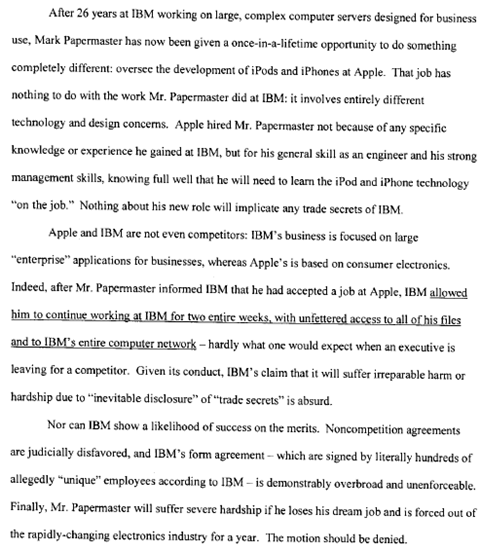The IBM-Apple-Papermaster triangle: How far does a non-compete go?

The courtroom tug-of-war between IBM and Mark Papermaster is getting nasty. Papermaster responded Friday to IBM's attempts to prevent him from taking over the iPod unit at Apple. Papermaster argued that IBM doesn't compete with Apple in consumer electronics. IBM reiterated that Papermaster violated a non-compete agreement. Now a judge is preventing Papermaster from working at Apple. The two big issues: How binding is a non-compete agreement? And is the mere fact that microprocessors run consumer and enterprise technology enough to keep Papermaster from his dream job?
In this Papermaster case, those questions loom large. If Papermaster, the executive in formerly in charge of IBM's blade server unit, was going to Apple to run the xServe product line Big Blue would have an easy argument to understand. But since Papermaster is going into consumer electronics--a place where IBM doesn't play ball anymore--the executive has a good argument.
Here's a look at Papermaster's reply (PDF) to IBM's original suit, Big Blue's reply (PDF) and the judge's call (PDF). You can decide for yourself, but Papermaster may have a point when he complains that IBM's agreement is too broad.
Also see: Apple’s top iPod gun to depart; Papermaster in; Jobs succession gets murkier
IBM sues brainiac looking to leap to Apple; Download the docs
Here's Papermaster's argument in a nutshell:The key elements in that excerpt are the following:
- A lot of folks sign these non-compete agreements;
- They are too broad;
- IBM actions--leaving Papermaster's network account running--indicate that the company doesn't view Apple as a competitor.
That final point is very interesting. Rest assured that if Papermaster quit to go to HP's blade unit he would have been escorted out of the building.
IBM fired back at Papermaster.
The big argument here: All electronics run on microprocessors. Papermaster has IBM's trade secrets and knows the chip business. Therefore, Papermaster shouldn't be able to work at Apple. That's a bit broad, but it's hard to argue that chips don't run everything. IBM continued:
You can argue that IBM is stretching, but a judge obviously begs to differ. Papermaster can't join Apple before another hearing Nov. 18. This spat will make anyone think twice--or ask for more specific language--before signing any non-compete agreement.
